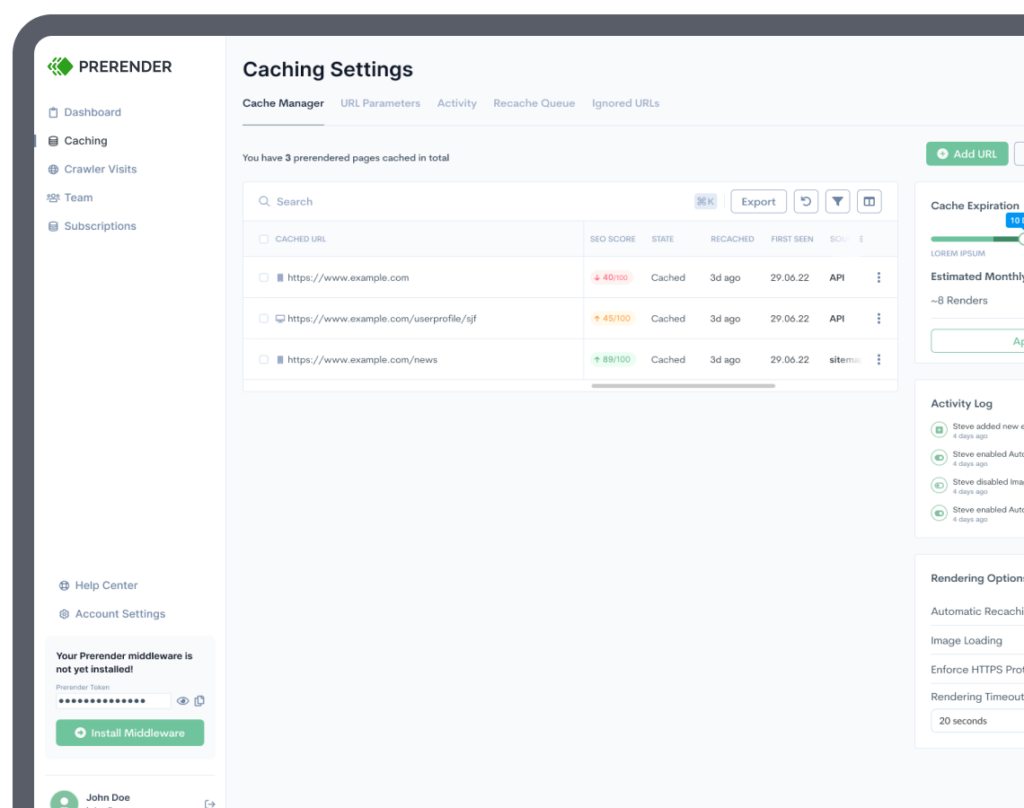We know that Google’s job is to provide its users with the best answer possible to their queries—and they do this by analyzing over 200 ranking factors. This way, they ensure they give the top spots to the most relevant, trustworthy, and user-friendly pages covering the target topic.
However, as time passes, Google’s algorithms evolve, and the rules change, impacting the ranking of millions of websites and, thus, organic traffic.
Trying to work on every single signal at once will overwhelm your team – even more so if you’re a one-person SEO team – so it’s important to prioritize tasks and strategies to make the most out of your resources.
One thing to remember is that Google might put more weight on certain ranking factors based on the industry you serve. For example, a news site should focus on keeping its content fresh and covering the latest events around a topic, while finance websites should center their efforts on building expertise and trustworthiness to be considered for the top positions.
In this guide, we’ll highlight the latest ranking factors with the highest impact on your organic performance to help you focus on what matters and avoid future traffic drops.
1. Content Quality
Content quality is crucial for ranking in Google, and it’s obvious as to why when you understand its role in the search engine ecosystem. Content is the answer to the user’s queries, and its quality is what makes these users come back and stay engaged with the search engine.
The reality is that if Google started to promote bad content, people would flood to its competitors. So, Google makes a lot of efforts to provide the best results in its index.
Resource: Here’s a guide to understanding how Google’s index works.
Although content quality might seem somewhat subjective, it all comes down to four factors:
Search Intent
When you ask people about quality content, the answer is always along the lines of being useful, providing value, or being practical, which are all true. At the end of the day, all these definitions mean one thing: satisfy the search intent.
Behind every query, there’s an intention. The searcher wants to solve a problem or learn about a specific topic, and when your content matches this intent is when it creates value.
Think about it this way: if you search “latest ranking factors” in Google, do you want to read a page about optimizing a website, or do you want a list of ranking factors you should focus on?
Search intent is about understanding the core need of the searcher and creating a piece of content that fulfills this need.
Content Structure
The second signal of quality content is its structure.
Well-structured content is easier to read and understand (for both humans and search engines), so Google will look for these elements to ensure you’re providing a good reading experience:
- Good use of headers and subheadings (H1, H2, H3…) to divide the page into sections
- Bullet points and numbered lists
- Images and videos breaking down long blocks of text
Using the proper structure will also help visitors find pieces of information faster while making them engage with your content longer.
On-Page Elements
Of course, Google can’t read your content as normal humans would. Hence, it’s important to provide it as much help as possible by optimizing on-page elements, like:
- Title tags
- Meta descriptions
- Headings
- Primary keyword in the opening paragraph
- Image alt texts
- Anchor texts (for both external and internal resources)
- URLs
These elements will help Google understand and categorize your content better.
Uniqueness
Of course, high-quality content has an original angle that separates it from the rest of the competition. After all, if your page provides the same experience as what’s already ranking, why would Google choose yours? Google rewards pages that provide a better experience than what’s already out there and heavily penalize plagiarism.
Note: This also means we need to avoid duplicate content issues, as Google could easily flag our pages, hurting not only those flagged but the entire domain.
| Additional Note Another indicator of quality content is freshness. Keeping your content up to date using the newest statistics, fresh information about your target topic, and reworking now irrelevant information is crucial to boost your organic performance. Freshness is even more important for time-sensitive keywords. For example, Google prioritizes web pages covering the latest developments and trends for health-related terms, as the most up-to-date information and statistics will highly benefit the end user. |
Resource: Website Optimization For Humans vs. Bots
2. Domain Authority and Trustworthiness
Searchers trust the sources Google provides without too much thought, and that’s a big responsibility. Especially because, in some cases, the wrong answer can be extremely dangerous – for example, in medical situations.
For Google to keep the trust of its users, it needs to corroborate if your content is accurate, and that’s where domain authority and trustworthiness come into play.
Although the score we tend to use to measure domain authority is an invention from SEO tools like Ahrefs and Moz, we know for certain that Google uses several signals to determine whether or not a domain is trustworthy and an authority in its industry.
The first and more commonly known signal of authority and trustworthiness is backlinks. When a website adds a link to a page from another domain, it works like a vote of trust, and it’s a clear signal to Google that the page provides accurate information.
Of course, not all backlinks are the same, so links from authoritative domains are worth more than backlinks from low-quality sources.
Another important signal Google considers is topical relevance, which improves by creating high-quality content around a single topic. This is one of the reasons why topic clusters are so popular in SEO.
When you cover a topic from almost every angle (targeting all keywords related to the topic) in a structured format, Google will perceive you as a relevant source for those topics.
Just think about it for a second. Would you go to a gaming site to learn how to do your taxes, or would you trust a financial website more?
The importance of this ranking factor is shown in the latest E-E-A-T guidelines update and Google’s “Your Money, Your Life” algorithm.
Resource: 6 Startup Unicorns With the Best SEO Strategy in 2022
3. Site Speed and Performance
In the last few years, Google has put a great emphasis on user experience as a determining ranking factor, and nothing influences user experience more than site speed and performance.
However, it’s important to understand that it goes beyond just how fast your website can load its content. So much so that Google launched a set of new measuring factors with the Core Web Vitals update – which are now confirmed to be the only site speed measurement being used.
These metrics are meant to ensure your pages load and become interactive fast (largest contentful paint and first input delay) without sacrificing visual stability (cumulative layout shift).
One of the most challenging aspects of optimizing site performance for large websites is handling JavaScript – especially for mobile devices.
To help you with this, here are seven strategies to optimize your JavaScript for site performance. After optimizing how you’re using JavaScript and rendering your site, you’ll quickly experience a positive impact on your organic performance.
In terms of performance, it’s also essential to keep mobile-friendliness in mind.
With more searches coming from mobile devices than ever, Google made mobile-friendliness a crucial ranking factor for mobile and desktop versions of your site in 2019.
In other words, implementing a responsive web design philosophy and keeping in mind that mobile devices have different needs will help you go up in the rankings.
Resource: 10 Best Tips for Making Your Website Mobile Friendly
4. Site Architecture
Before indexing your site, Google needs to be able to crawl it to discover your pages and understand how the entire site is structured and the relationship between the different pages.
Your website is the accumulation of different pages (files) within a single domain, and the way every page is linked to one another is what we call site architecture.
Using internal links strategically and grouping pages based on topic and intent, you can create a more logical structure that’ll help Google crawl and categorize your website faster, which translates into faster indexation and better rankings.
Of course, creating an information architecture (as it’s also called) that scales well can be challenging and requires a lot of planning.
That said, you can create a crawl-friendly structure by setting well-defined categories and planning your navigation ahead of time. Once these two things are set, you can start building the pages to fill the plan with a clear vision of internal links and hierarchy.
Resource: How to Improve and Scale Enterprise SEO Rankings
5. Site’s Security
Although security isn’t as sexy as talking about content or technical SEO, it is still a crucial ranking signal for your SEO success.
One of the first things Google will check when analyzing your website is whether or not you’re using an HTTPS protocol to ensure that sensitive data is being encrypted and can’t be seen by 3rd parties intercepting the traffic.
This is even more important for websites that handle login credentials, credit card information, and any kind of sensitive personal information from their users.
Final Thoughts
While there are many more ranking factors to consider, prioritizing these five will win you 90% of the battle.
In the end, Google wants to offer the best result for searchers, so your job isn’t to hit a set of check marks but to ensure that your pages are the best possible result available.
If you treat these ranking factors as different methods to measure the quality of your website, you’ll notice that not only you’ll get better results from SEO, but you’ll also start converting more visitors into paying customers and achieve your business goals.



